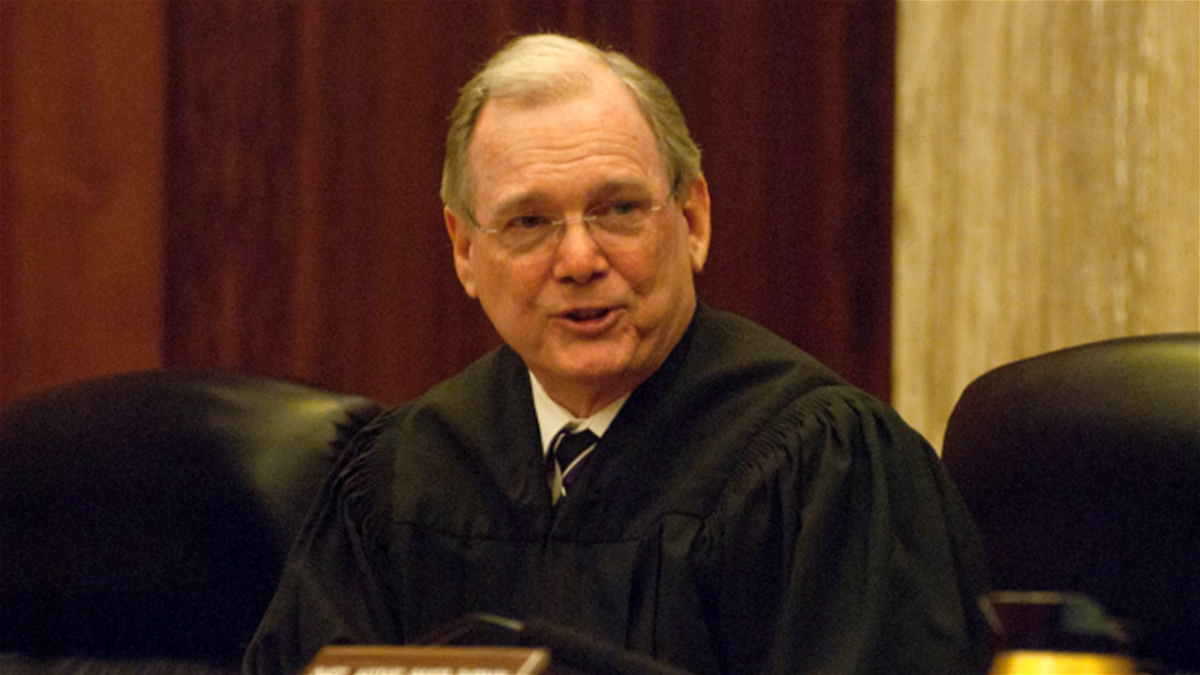Former Idaho Supreme Court Justice Daniel Eismann dies at 77

BOISE, Idaho (Supreme Court News Release) - The Hon. Daniel T. Eismann, former chief justice of the Idaho Supreme Court, died late Tuesday night at a Boise-area hospital. He was 77.
Governor Brad Little has ordered the lowering of flags in honor of Eismann beginning at sunrise on Thursday, June 6 and ending Friday, June 7 at sunset.
Chief Justice Eismann spent 31 years as part of Idaho’s judiciary, serving the state courts at multiple levels before his retirement in 2017. He was instrumental in developing this state’s system of treatment courts, in supporting the interests of children caught up in court proceedings, and in encouraging more women to seek to become judges.
Information on memorial services will be released at a later date through Alden-Waggoner Funeral Chapel.
“Justice Eismann was a towering figure in the law, who exemplified the highest standards of judicial excellence and unwavering commitment to justice throughout his distinguished career,” current Chief Justice G. Richard Bevan said Wednesday. “He will be remembered for his significant contributions to the law and the profound influence he had on all who had the privilege of associating with him.”
Chief Justice Eismann was raised in southwest Idaho, graduating in 1965 from Vallivue High School in Caldwell. He studied law at the University of Idaho, but first served two consecutive tours of duty with the Army in Vietnam. As a crew chief/door gunner on a Huey gunship, he was awarded two Purple Hearts for being wounded in combat and three medals for heroism.
He graduated from law school in 1976 and practiced law for 10 years, then was appointed as a magistrate judge for Owyhee County. As a magistrate judge he was involved in several efforts focused on youth: He helped create Children’s Voices Inc., an organization to recruit, train and oversee guardians ad litem to represent the interests of neglected and abused children in court proceedings, and he organized and served on a community diversion board that handled situations for first-time, minor juvenile offenders outside of the judicial system.
Chief Justice Eismann in 1995 was appointed as a district judge in Ada County. Convinced that there must be a more effective way to deal with the burgeoning drug problem, he began working to set up a drug court in Ada County, in the process becoming the first drug court judge in Idaho. In 1998, Ada County was awarded a federal grant, and the drug court began receiving participants in February 1999. The Ada County Drug Court has proved effective in reducing recidivism and getting addicts off drugs so that they can restore their lives, rebuild their family relationships, and become productive members of the community.
 Justice Eismann's formal portrait at the Supreme Court. |
In 2000, the people of Idaho elected Justice Eismann to the Idaho Supreme Court, where he began serving on Jan. 2, 2001. He remained on the Court until his retirement, serving as its chief justice from 2007 to 2011. As a justice, he continued to grow Idaho’s treatment courts, co-chaired Idaho Partners Against Domestic Violence and served on the state Criminal Justice Commission.
Because there were not enough qualified women seeking judicial appointments, Chief Justice Eismann appointed Judges Karen Lansing and Sergio Gutierrez of the Idaho Court of Appeals to chair a committee seeking ways to encourage more qualified women to apply for judicial appointments. As a result of their efforts, seven women in a row were appointed to judicial positions, and women continue to be appointed.
In retirement, Chief Justice Eismann enjoyed reading, writing, and spending time with his extended family, whom he moved to Boise to be closer to. In December 2020 he became the first recipient of the Daniel T. Eismann Award for Excellence in Treatment Courts. The award in his name continues to be given every two years to an Idaho judge who demonstrates exceptional leadership and commitment to the success of their treatment court team and participants.






